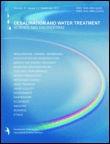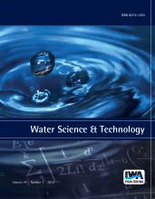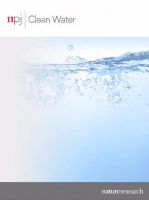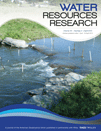
ACS ES&T Water
Scope & Guideline
Connecting researchers and policymakers for water innovation.
Introduction
Aims and Scopes
- Water Quality Management and Treatment Technologies:
Focuses on the development and optimization of technologies for water treatment, including advanced oxidation processes, membrane technologies, and bioreactors. - Impact of Emerging Contaminants:
Explores the occurrence, fate, and removal of pollutants such as per- and polyfluoroalkyl substances (PFAS), pharmaceuticals, and microplastics in water systems. - Microbial Ecology and Pathogen Dynamics:
Investigates the role of microbial communities in water treatment and the dynamics of pathogens, including their detection and management in drinking water. - Water Resource Sustainability:
Addresses sustainable practices in water resource management, including resource recovery, waste minimization, and the implications of climate change on water systems. - Innovative Analytical Techniques:
Utilizes advanced analytical methods, including machine learning and high-resolution mass spectrometry, for monitoring and assessing water quality.
Trending and Emerging
- Wastewater-Based Epidemiology:
A rapidly growing area of research, particularly in light of the COVID-19 pandemic, focusing on using wastewater analysis to track viral outbreaks and public health trends. - Advanced Oxidation Processes and Catalytic Technologies:
Increasing interest in novel oxidation processes and catalytic systems for the degradation of complex organic pollutants, particularly under variable environmental conditions. - Microbial Resource Recovery:
Emerging studies on the use of microbial processes for resource recovery, including nutrients from wastewater and energy generation through bioconversion. - Machine Learning and Data-Driven Approaches:
A notable trend towards integrating machine learning and artificial intelligence in water quality modeling, contaminant tracking, and treatment optimization. - Nutrient Recovery and Circular Economy Practices:
Growing emphasis on sustainable practices that recover nutrients from wastewater for reuse, aligning with global sustainability goals.
Declining or Waning
- Traditional Water Treatment Methods:
Research on conventional water treatment processes is becoming less prevalent, as newer, more efficient technologies and methods gain attention. - Basic Water Quality Monitoring:
Basic monitoring studies without innovative analytical techniques or complex modeling approaches are less frequently published, highlighting a shift towards more advanced methodologies. - Single-Pollutant Studies:
There is a noticeable decrease in studies focusing solely on the removal or impact of a single type of pollutant, with a growing emphasis on multi-pollutant interactions. - Historical Water Quality Trends:
Research focused on historical analyses of water quality is less common, as contemporary studies increasingly emphasize real-time data and predictive modeling.
Similar Journals

Desalination and Water Treatment
Transforming Water, Enriching LivesDesalination and Water Treatment is a pivotal journal in the realm of water science and technology, focusing on the critical issues surrounding water desalination and treatment processes. Published by DESALINATION PUBL in the United States, this journal, with ISSN 1944-3994 and E-ISSN 1944-3986, serves as an essential resource for researchers, professionals, and students engaged in ocean engineering, pollution control, and innovative water management strategies. With a transitional coverage from 2009 to 2024, it holds a respectable position in the third quartile of various categories, including Ocean Engineering, Pollution, and Water Science and Technology, as of 2023. The journal is indexed in Scopus, reflecting its contribution to the field by ranking within the 39th to 45th percentile across relevant subject areas. Although not an open-access publication, it remains a crucial platform for disseminating influential research, thereby enhancing the global repository of knowledge on water treatment methodologies and sustainable practices in desalination.

WATER SCIENCE AND TECHNOLOGY
Shaping the future of water through research and innovation.WATER SCIENCE AND TECHNOLOGY, published by IWA PUBLISHING, is a leading academic journal dedicated to advancing the field of water science and technology. With a rich history dating back to 1970, the journal provides a platform for innovative research and technological advancements, catering to the vital challenges faced within the realms of environmental engineering and water resource management. As evidenced by its strong ranking in Scopus, where it holds a position of #86 in Water Science and Technology and #77 in Environmental Engineering, the journal exemplifies significant scholarly contributions, reflected in its Q2 quartile status in both categories as of 2023. Although not an open access journal, WATER SCIENCE AND TECHNOLOGY ensures that its articles are widely available to researchers, professionals, and students passionate about sustainable water solutions. With a continued commitment to excellence, this journal plays a crucial role in shaping the discourse surrounding water quality, conservation, and technology innovation, making it an essential resource for all stakeholders in this critical field.

Water Resources
Fostering scholarly dialogue on critical water issues.Water Resources, a prominent journal published by MAIK NAUKA/INTERPERIODICA/SPRINGER, focuses on the critical and evolving field of water science and technology. Established in 1976 and with a long-standing commitment to advancing knowledge, this journal explores interdisciplinary research that addresses the challenges surrounding water resource management, quality, and sustainability. With an impact factor positioned within the Q3 category of its field, it holds a notable Scopus rank (#181/261) in Environmental Science, emphasizing its role in driving scholarly discourse. While currently not open access, Water Resources provides vital insights for researchers, professionals, and students, making it an essential resource for those seeking to innovate and implement effective water management solutions. To stay ahead in a domain that is increasingly paramount to global sustainability efforts, consider engaging with the latest research published in this vital journal.

Asian Journal of Water Environment and Pollution
Exploring innovative pathways to cleaner water.Asian Journal of Water Environment and Pollution is a leading academic journal published by IOS PRESS, dedicated to advancing the field of water science and technology, as well as pollution management. With its ISSN 0972-9860 and E-ISSN 1875-8568, this journal serves as a pivotal platform for researchers, professionals, and academics alike who are keen to explore innovative solutions and interdisciplinary approaches toward water-related challenges and environmental issues. Although currently positioned in the Q4 category for both pollution and water science & technology, the journal aims to foster impactful research and discussions that can enhance the understanding and treatment of water pollution. The Asian Journal of Water Environment and Pollution not only plays a crucial role in disseminating knowledge but also encourages the sharing of findings from unique geographic perspectives, particularly from Asia. As the field evolves, this journal is poised to become a vital resource for those looking to contribute to sustainable water management practices and pollution reduction strategies.

Water
Unlocking the mysteries of water through collaborative science.Water, an esteemed journal published by MDPI, serves as a pivotal resource for global research in the fields of aquatic science, biochemistry, geography, and water science and technology. Since its inception in 2009, this open-access journal has committed itself to advancing knowledge regarding water-related topics by fostering a platform that encourages the dissemination of high-quality research. With its impressive impact factor reflecting its relevance and influence, Water ranks in the top quartiles in various categories, including Q1 in Aquatic Science and Water Science and Technology, showcasing its commitment to publishing cutting-edge findings that resonate deeply with the environmental and biological sciences community. Located in Basel, Switzerland, the journal prioritizes accessibility for researchers, professionals, and students alike, aligning with the broader scientific goal of addressing urgent water challenges through collaborative and interdisciplinary research.

npj Clean Water
Championing global collaboration for water quality.npj Clean Water, published by NATURE PORTFOLIO, is a premier open-access journal dedicated to advancing the field of water science and technology. Since its launch in 2018, this innovative publication has quickly established itself as a leading platform for original research and policy discussions concerning clean water access and quality. With an impressive impact factor and categorized in the Q1 Quartile across multiple environmental science disciplines—including management, monitoring, pollution, and waste management—npj Clean Water stands out for its rigorous peer-review process and commitment to disseminating high-quality research. Researchers, professionals, and students involved in water-related challenges will find invaluable insights that address critical environmental issues and promote sustainable practices. Access to articles is freely available, encouraging global collaboration and knowledge sharing within the water sector. This journal embodies a significant step towards achieving innovation and policy advancements in the pursuit of a cleaner, safer water future.

WATER RESOURCES RESEARCH
Empowering Knowledge in Water Resource ScienceWATER RESOURCES RESEARCH, published by the American Geophysical Union, stands as a premier journal in the field of environmental science, specifically within the domain of water science and technology. With an impressive impact factor and a categorical ranking of Q1 for 2023, it ranks within the top 10% of relevant journals, evidencing its critical role in advancing the knowledge and application of water resources research. Since its inception in 1965, the journal has been dedicated to rigorous research that addresses pressing global challenges related to water resource management, hydrology, and environmental sustainability. The journal's comprehensive publication scope aims to present innovative findings and methodologies that can shape effective policies and practices. Although it does not offer open access, the robust research it publishes continues to influence academics and practitioners alike, ensuring its position as an essential resource for anyone engaged in the pursuit of water-related knowledge and solutions.

Journal of Applied Water Engineering and Research
Transforming Research into Real-World Water SolutionsJournal of Applied Water Engineering and Research is a dynamic platform dedicated to the advancement of knowledge in the field of water science and technology. Published by Taylor & Francis Ltd, this journal aims to bridge the gap between theoretical research and practical applications in water engineering, providing a crucial resource for researchers, practitioners, and policymakers. With an ISSN of 2324-9676 and an impressive ranking in the Q3 category for Water Science and Technology, it occupies a distinctive position within the scholarly community. The journal covers a wide spectrum of topics, including innovative water management strategies, sustainable practices, and the integration of technology in water resource management, thus contributing significantly to the discourse surrounding environmental sustainability. With publication years converging from 2013 to 2024, the Journal of Applied Water Engineering and Research continues to foster impactful research, enhancing our understanding and management of vital water resources.

Water Conservation Science and Engineering
Fostering Collaboration for a Sustainable Water FutureWater Conservation Science and Engineering, published by SPRINGERNATURE, is a vital academic journal dedicated to advancing the fields of environmental engineering, ocean engineering, waste management, and water science and technology. Since its inception in 2016, the journal has quickly established itself within the academic community, achieving a commendable Q3 ranking across multiple categories in 2023. With an ISSN of 2366-3340 and an E-ISSN of 2364-5687, it is accessible to a global readership eager to explore the latest research and innovations in water conservation and sustainable practices. Although currently not open access, the journal is committed to publishing high-quality scholarly articles that provide insights into effective water management strategies, innovative engineering solutions, and the critical importance of preserving our water resources. Based in Singapore, Water Conservation Science and Engineering aims to foster interdisciplinary collaboration among researchers, professionals, and students, making it an essential resource for anyone passionate about environmental sustainability and preservation.

WATER RESOURCES MANAGEMENT
Exploring the Frontiers of Water Science and EngineeringWATER RESOURCES MANAGEMENT is a prestigious journal published by SPRINGER, renowned for its contribution to the fields of Civil and Structural Engineering as well as Water Science and Technology. Operating since 1987, this journal has established itself as a vital resource for researchers, professionals, and students alike, boasting a remarkable impact factor and a Q1 designation in both relevant categories as of 2023. The journal is indexed in Scopus, achieving commendable ranks—34th in Environmental Science and 62nd in Civil and Structural Engineering, placing it in the top percentiles of its fields. Although it does not offer open access, WATER RESOURCES MANAGEMENT serves as a comprehensive platform for disseminating innovative research, discussions, and case studies that address the global challenges of water resource management. With a commitment to fostering knowledge and advancing the understanding of integrated water management solutions, this journal is indispensable for anyone engaged in these critical scientific domains.